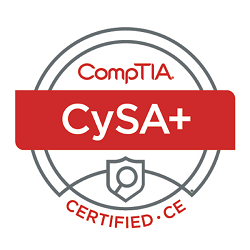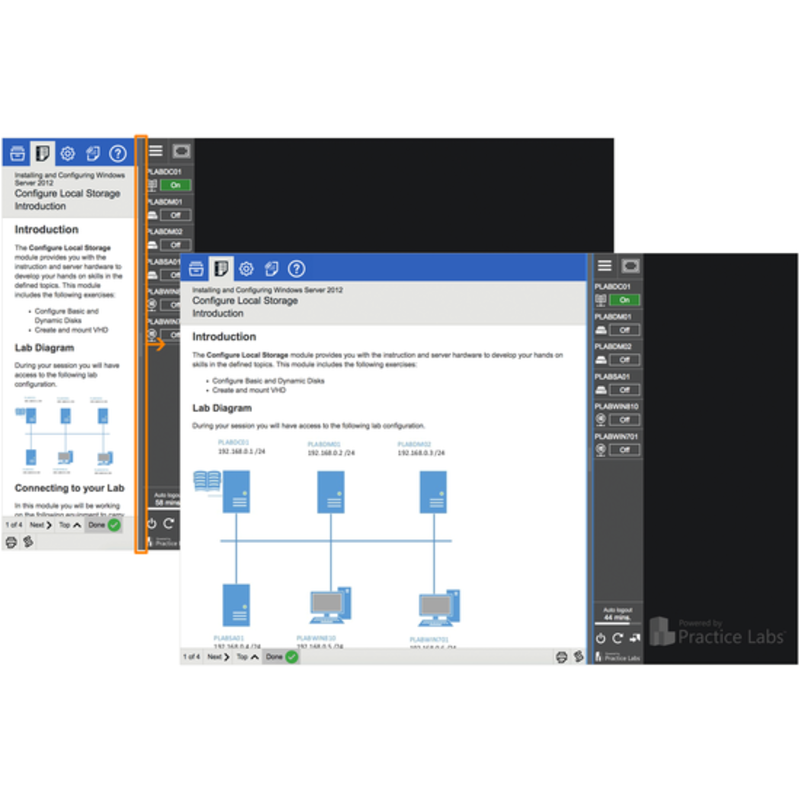Cybersecurity Analyst CompTIA CySA+

The CompTIA CySA+ Cybersecurity Analyst Course is designed to provide participants with the skills and knowledge needed to excel in the field of cybersecurity and network defense. The course covers topics such as identifying, analyzing, and responding to cyber threats, protecting critical infrastructure, and supporting security operations within organizations. Participants will learn to monitor and protect networks using advanced technologies and methodologies, manage vulnerabilities and security risks, and collaborate with other business functions to ensure infrastructure resilience. The course also emphasizes the application of cybersecurity principles and the development of practical skills for preventing, detecting, and mitigating cyberattacks. The course contributes to the preparation of the CompTIA CySA+ Certification exam .
Course Objectives
Below is a summary of the main objectives of the CompTIA CySA+ Cybersecurity Analyst Course :
- Develop skills to identify, analyze and respond to cyber threats.
- Protect critical infrastructure and support security operations in organizations.
- Apply cybersecurity principles and develop practical skills for attack mitigation.
- Gain experience in monitoring and protecting networks with advanced technologies and methodologies.
- Manage vulnerabilities and security risks, working with other business functions.
- Conduct proactive threat hunting to detect and prevent potential security incidents.
- Utilize digital forensics tools and techniques to investigate security breaches.
- Implement incident response strategies and recovery plans to minimize business impact.
Course Certification
This course helps you prepare to take the:
CS0-003 CompTIA CySA+ Exam;
Course Outline
Introduction to Cybersecurity
- Understanding the cybersecurity landscape
- Roles and responsibilities in cybersecurity
- Cybersecurity frameworks and best practices
Threat Management
- Identifying and categorizing threats
- Threat intelligence and information sharing
- Security information and event management (SIEM)
Vulnerability Management
- Vulnerability scanning and assessment
- Patch management and secure configurations
- Remediation and mitigation strategies
Incident Response
- Incident response planning and procedures
- Forensics and evidence collection
- Incident analysis and recovery
Security Architecture and Toolsets
- Network security technologies and principles
- Endpoint and mobile security
- Cloud and virtualization security
Risk Management
- Risk assessment and management
- Business continuity and disaster recovery planning
- Third-party risk management
Compliance and Security Controls
- Legal, regulatory, and privacy considerations
- Security policies, standards, and procedures
- Security awareness and training
Hands-on Labs and Practical Exercises
- Real-world cybersecurity scenarios
- Configuring security tools and technologies
- Analyzing and interpreting security data
Laboratory Activities
- Analyzing Output from Network Security Monitoring Tools
- Discovering the Lab Environment
- Analyzing Output from Security Appliance Logs
- Analyzing Output from Endpoint Security Monitoring Tools
- Analyzing Email Headers
- Configuring SIEM Agents and Collectors
- Analyzing, Filtering, and Searching Event Log and syslog Output
- Collecting and Validating Digital Evidence
- Analyzing Network-related IoCs
- Analyzing Host and Application IoCs
- Observing IoCs during a Security Incident
- Analyzing Output from Topology and Host Enumeration Tools
- Testing Credential Security
- Configuring Vulnerability Scanning and Analyzing Outputs
- Assessing Vulnerability Scan Outputs
- Assessing the Impact of Regulation on Vulnerability Management
- Performing Account and Permissions Audits
- Configuring Network Segmentation and Security
- Configuring and Analyzing Share Permissions
- Assessing the Impact of Web Application Vulnerabilities
- Analyzing Output from Web Application Assessment Tools
- Analyzing Output from Cloud Infrastructure Assessment Tools
Course Mode
Instructor-Led Remote Live Classroom Training;
Trainers
Trainers are Cisco Official Instructors and certified in other IT technologies, with years of hands-on experience in the industry and in Training.
Lab Topology
For all types of delivery, the Trainee can access real Cisco equipment and systems in our laboratories or directly at the Cisco data centers remotely 24 hours a day. Each participant has access to implement the various configurations thus having a practical and immediate feedback of the theoretical concepts.
Here are some Cisco Labs network topologies available:

Course Details
Course Prerequisites
- We recommend taking the CBROPS Cybersecurity Course or the CompTIA Security+ Course .
Course Duration
Intensive duration 5 days
Course Frequency
Course Duration: 5 days (9.00 to 17.00) - Ask for other types of attendance.
Course Date
- Corso Cybersecurity Analyst CompTIA CySA+ (Intensive Formula) – On request – 9:00 – 17:00
Steps to Enroll
Registration takes place by asking to be contacted from the following link, or by contacting the office at the international number +355 45 301 313 or by sending a request to the email info@hadartraining.com


